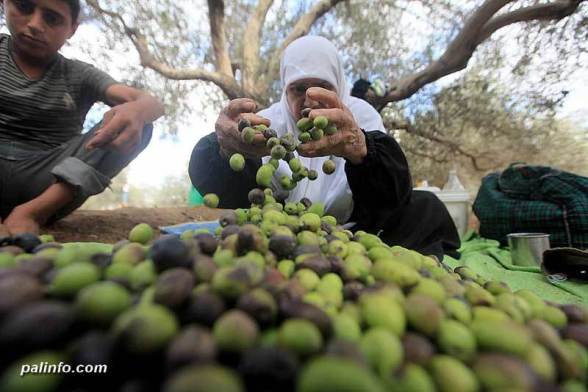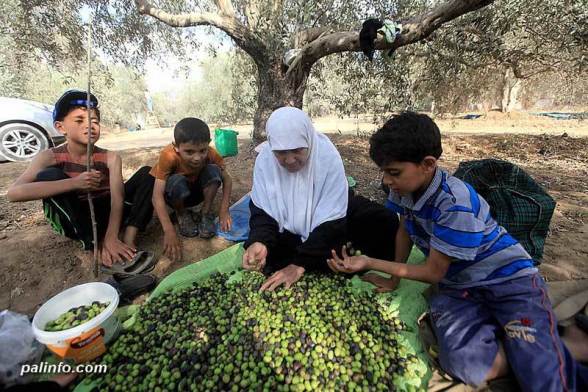by Marivel Guzman
On August 10, International Solidarity Movement called the international community of Palestinians supporters to come to Palestine to help the residents to harvest the 2013 Olive Harvest. Every year the settlers makes the harvest almost impossible, the presence of ISM members with their cameras y their bodies as human shields help Palestinians to get to their groves without being molested by the settlers.
Every year hundreds of Olive trees are burn or uprooted by settlers, the IDFs presence is obsolete, they do not defend the rights of the Palestinians, for the contrary their presence strengthen the settlers bully attitude.
“We often post distressing news of settlers uprooting, burning or wrecking the olive trees of Palestinians. There is such a report from Sarta, in the north-west West Bank at the foot of this post. But first, we post some lovely photos from Palinfo.com of Palestinians – men and women, young and old – picking and sorting their olives in settler-free Gaza.” Jews for Justice for Palestine






Settlers burn olive trees in Sarta
From International Solidarity Movement, Nablus Team
September 27, 2013
Settlers burned around 35 olive trees in the Palestinian village of Sarta late on Thursday night, following the area being declared a closed military zone in preparation for the construction of a new settler road.
Around 60 settlers from the illegal Bruchin settlement and surrounding area, many armed with guns, set fire to the trees late on Thursday 26th September. At around midnight, the settlers arrived in Sarta. The town mayor asked the Palestinian Authority to liaise with the Israeli army in order to intervene, but when Israeli forces arrived on the scene they informed villagers that the area had been declared closed and told them to leave.
Two days earlier, town residents witnessed four bulldozers arrive in the village to prepare the ground for the construction of the road, which will connect the settlement with road five and is part of an expansion plan for the settlement which will take it from 40 houses to around 550.
The proposed road and settlement expansion is a source of concern to local Palestinians, who stand to lose much of their land under new plans, including local features such as a 500-year-old cemetery.
On August 10, International Solidarity Movement called the international community of Palestinians supporters to come to Palestine to help the residents to harvest the 2013 Olive Harvest. Every year the settlers makes the harvest almost impossible, the presence of ISM members with their cameras y their bodies as human shields help Palestinians to get to their groves without being molested by the settlers.
Every year hundreds of Olive trees are burn or uprooted by settlers, the IDFs presence is obsolete, they do not defend the rights of the Palestinians, for the contrary their presence strengthen the settlers bully attitude.
Harvesting the olives in Gaza, 2013






Settlers burn olive trees in Sarta
From International Solidarity Movement, Nablus Team
September 27, 2013
Settlers burned around 35 olive trees in the Palestinian village of Sarta late on Thursday night, following the area being declared a closed military zone in preparation for the construction of a new settler road.
Around 60 settlers from the illegal Bruchin settlement and surrounding area, many armed with guns, set fire to the trees late on Thursday 26th September. At around midnight, the settlers arrived in Sarta. The town mayor asked the Palestinian Authority to liaise with the Israeli army in order to intervene, but when Israeli forces arrived on the scene they informed villagers that the area had been declared closed and told them to leave.
Two days earlier, town residents witnessed four bulldozers arrive in the village to prepare the ground for the construction of the road, which will connect the settlement with road five and is part of an expansion plan for the settlement which will take it from 40 houses to around 550.
The proposed road and settlement expansion is a source of concern to local Palestinians, who stand to lose much of their land under new plans, including local features such as a 500-year-old cemetery.